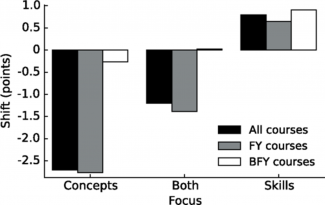The Colorado Learning Attitudes about Science Survey for Experimental Physics (E-CLASS) was developed as a broadly applicable assessment tool for undergraduate physics lab courses. At the beginning and end of the semester, the E-CLASS assesses students' views about their strategies, habits of mind, and attitudes when doing experiments in lab classes. Students also reflect on how those same strategies, habits of mind, and attitudes are practiced by professional researchers. Finally, at the end of the semester, students reflect on how their own course valued those practices in terms of earning a good grade. In response to frequent calls to transform laboratory curricula to more closely align with the skills and abilities needed for professional research, the E-CLASS is a tool to assess students' perceptions of the gap between classroom laboratory instruction and professional research.
Instructors wishing to use E-CLASS in their own courses can learn more here.



 The Physics Frontiers Centers (PFC) program supports university-based centers and institutes where the collective efforts of a larger group of individuals can enable transformational advances in the most promising research areas. The program is designed to foster major breakthroughs at the intellectual frontiers of physics by providing needed resources such as combinations of talents, skills, disciplines, and/or specialized infrastructure, not usually available to individual investigators or small groups, in an environment in which the collective efforts of the larger group can be shown to be seminal to promoting significant progress in the science and the education of students. PFCs also include creative, substantive activities aimed at enhancing education, broadening participation of traditionally underrepresented groups, and outreach to the scientific community and general public.
The Physics Frontiers Centers (PFC) program supports university-based centers and institutes where the collective efforts of a larger group of individuals can enable transformational advances in the most promising research areas. The program is designed to foster major breakthroughs at the intellectual frontiers of physics by providing needed resources such as combinations of talents, skills, disciplines, and/or specialized infrastructure, not usually available to individual investigators or small groups, in an environment in which the collective efforts of the larger group can be shown to be seminal to promoting significant progress in the science and the education of students. PFCs also include creative, substantive activities aimed at enhancing education, broadening participation of traditionally underrepresented groups, and outreach to the scientific community and general public.